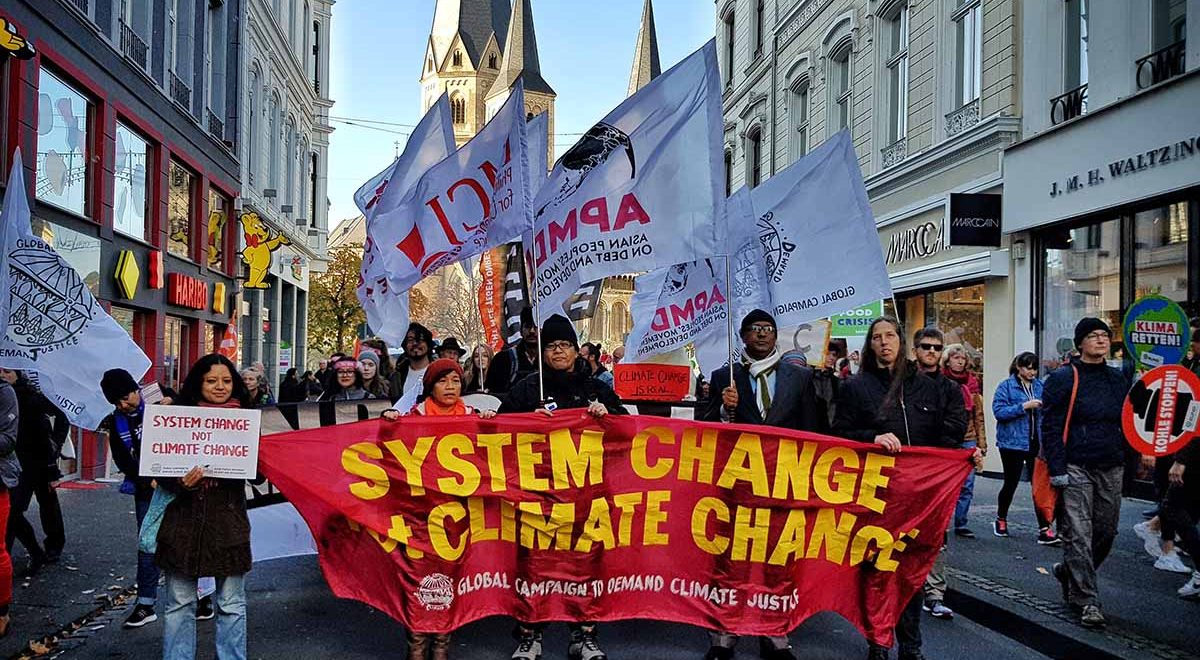This year’s round of UN climate negotiations are kicking off today, and ActionAid is here to stand in solidarity with the world’s most vulnerable people who are already feeling the impacts of climate change. The Pacific Island nation of Fiji is presiding over this year’s negotiations, though for economic reasons the conference is being physically held in Bonn, Germany, where the UN climate body is headquartered.
As always, there’s a lot going on at these negotiations, where almost 200 countries come together for two weeks to try to hammer out a global, cooperative approach to climate action. And that’s not to mention everything happening outside the talks – like the thousands-strong climate march pictured above, or the massive direct action that shut down a Rhineland coal mine for several hours this past Sunday.
But I want to highlight four main things to look for in this year’s negotiations:
1. Loss and Damage
It’s hard to ignore the symbolism of a tiny island nation presiding over a climate change negotiation. Undoubtedly, a major focus of negotiations will be on what is called “loss and damage” – how to support countries facing a range of climate impacts, including irreversible damage (such as rising sea levels for many island nations, or the massive levels of destruction and displacement faced by several Caribbean islands this past hurricane season). These negotiations have been ongoing and institutionalized since the creation of a “Warsaw International Mechanism” (WIM) for Loss & Damage in 2013. But rich countries have so far avoided conversations about actual financial support for poorer countries – a key function of the WIM. At some point, discussions about processes and mechanisms have to give way to hard negotiations about money.
2. Fairness and climate finance
Along with over 100 other civil society groups, ActionAid is releasing a report tomorrow making the case that for the global climate regime to succeed, it must be fair. In other words, wealthier countries that have polluted more must take more action, faster, to reduce their emissions. They must provide “climate finance,” or monetary support to poorer countries to help them in their own transition to clean development pathways. The discussion of climate finance has been sadly stalled for many years now, as rich countries generally refuse to provide the kind of money that will be necessary to spark a global transition to a sustainable economy, not to mention help poorer and more vulnerable communities adapt to climate impacts like floods, droughts and storms.
3. Making the Paris Agreement stronger
There are also important procedural matters under discussion at this year’s negotiations, namely the so-called “Talanoa Dialogue.” This dialogue is meant to be an assessment of country pledges and how they stack up to the Paris Agreement’s goal of limiting global temperature rise to no more than 1.5 degrees Celsius above preindustrial levels. The only reason we accepted the Paris Agreement – a weak, nonbinding agreement that puts us on a path for a 3-degree world or worse – is because it includes a mechanism for pressuring countries to increase their pledges. The Talanoa Dialogue is the first step in putting this mechanism into play, and will be held in 2018. Details of how it will play out will be discussed at these negotiations in Bonn. If the dialogue turns out to be nothing but a back-slapping exercise or a technical talk shop, the Paris Agreement will lose much of the credibility that it currently has as a tool for creating a global solution to climate change.
4. The role of the US
It’s a sad fact that the Trump administration and its actions will be a focus for the news media covering the climate negotiations this year. We don’t know exactly how the US will conduct itself here, but in the wake of Trump’s announcement that the US will withdraw from the Paris agreement, and his relentless rollbacks of domestic climate and environmental protections, many are bracing for the worst. One thing to keep in mind: some will say that “Trump is abandoning the US role of climate leadership.” This is a flawed premise. The US has never been a “climate leader.” On the contrary, our government has consistently worked to weaken global agreements on climate change. Trump is of course much worse than, say, Obama – but the US has always thrown its weight around in international negotiations, refusing to look past its own interests or to fully acknowledge its historical responsibility as a primary driver of the climate crisis.
The halls of the UN in Germany may seem far removed from the vulnerable communities on the ground that we work with. But decisions made here have far-reaching impacts, and conceding this space to reluctant governments, technocratic policymakers, and corporations whose profit interests are directly opposed to climate action is simply not an option. As a result, ActionAid has engaged in these negotiations for over a decade now – and we’ll continue the struggle here to push the world towards a world that is sustainable and just, with human rights at the center of the urgent climate action we need.





